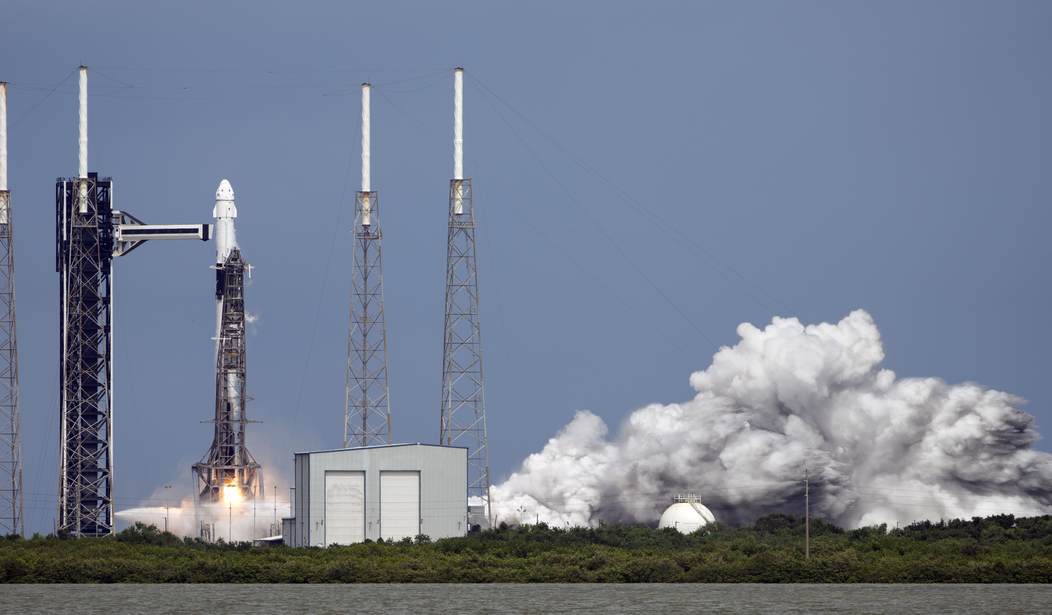I could make a pretty good case that 2024 was an interesting year, in the same sense as the apocryphal Chinese curse, and 2025 has already made a pretty good start on being interesting too. But as well as being interesting, 2025 looks to be ready to be an exciting year. Oh, little things like the Trump administration taking over and everything Trump has promised, we’ve already had some of the most amazing aurora, and there’s promise that Canada, the UK, and Germany are all preparing to come out of their 10-year coma of woke — can you actually have a coma of woke? Sure seems like it — but something really exciting is getting ready to go.
We already have this generation’s D.D. Harriman in Elon Musk, about to launch Starship again, and with any luck move Starship into operation and reduce cost-to-orbit dramatically, but sometime in the next few days, Jeff Bezos’ Blue Origin should launch the New Glenn rocket for its first orbital trial.
Have you noticed the naming convention there? The previous rocket, New Shepard calls back to Alan Shepard, the first American in space. It’s suborbital, and Shepard’s flight was suborbital. John Glenn was the first American in orbit, New Glenn is intended to be an orbital rocket.
I am an unabashed Elon Musk fan — go ahead, try to abash me about it, just try — but all you need to do is look at my Amazon account to see I’m a fan of what Bezos has done as well. (Hint: my Prime account saved me just over $1,000 in the last year.)
What I really am is an unabashed Heinleinist — I believe the highest ethical achievement is anything that serves the survival not just of one’s family or community or nation, but of one’s species. (To see Heinlein make exactly this point to the midshipmen of the U.S. Naval Academy, read “The Pragmatics of Patriotism.”) And while I admire Musk no end, for SpaceX and the Boring Company and Tesla and others, I am glad that he has some free-enterprise competition.
During Apollo, I was a big NASA fan too. Still am, to some extent, but — look, NASA, going back to the Space Shuttle, has suffered from the same disease that plagues the rest of government: flying rockets isn’t their main business. Their primary motivation is making Congress happy.
What makes Congress happy is different for each congresscritter, but pretty consistently, no matter what else they may think, one of their core motivations is getting more money into their congressional district. The logical conclusion to that is that the perfect government contract is one that has jobs in all 435 congressional districts, every one of the 50 states, and supports a bigger, more expansive federal government with big buildings and bigger budgets in D.C. and the surrounding states.
For a long time, NASA was the only game in town, at least for the United States, with the few companies capable of building rockets being long-time defense contractors who were used to cost-plus contracts and whose lobbyists screamed like frightened little girls at any attempt to cut costs because cutting costs on cost-plus means cutting profits. At the same time, under Nixon and then Carter there was pressure to cut costs.
One result of that was the Space Shuttle, which started out as a reusable personnel transportation vehicle, to be accompanied by a heavy lifter for large cargo like the then-classified Keyhole satellites and secondarily for components of a space station which would become the third leg of the stool, an orbiting laboratory. What Shuttle became was a portmanteau meant to satisfy all of those requirements, and did so at massive cost, dangerously and frankly badly.
Follow that with the Space Launch System, which costs more, does less, and is largely based on technology developed 50 years ago for Apollo. But by God, it put jobs in Mississippi, and that was important.
So we ended up in the odd situation that Russia — yes, that Russia, under Czar Putin — had a monopoly on U.S. astronauts getting to the Space Station, and was selling us a very large part of the rocket engines for U.S. rockets.
\People forget that before \@SpaceX\, the U.S. was reliant on Russia to send astronauts to the International Space Station and Russian-made rocket engines to launch pretty much everything else in orbit. \https://t.co/LGQFRBzwca\\— ALEX (@ajtourville) \September 17, 2024\\ \
This was pre-DOGE but shows the case for DOGE that Musk would be making: SpaceX launches more mass in a year than the Shuttle did ever — CHECK — because the goal was lower costs and the cash wasn’t unlimited. (It was so unlimited that Musk almost went broke personally before the first successful launch. No one at NASA or ULA is going broke over SLS.)
As Vodkapundit Stephen Green points out, by risking going broke, Musk is now positioned in a way that could make him the first trillionaire. Which is great. But monopolies, even if the monopolist is a paragon of capitalist virtue, breed complacency and excess.
Now, with any luck, Bezos is going to launch New Glenn, and Musk’s SpaceX will have some real competition.
NASA can get out of the launch business; ULA will have to find a way to build rockets cheaply (or ramp up its lobbying budget mightily with DOGE snapping at its heels) and with more rockets built by people who want to get into the market or get more from the market because they want to follow Musk into the ranks of trillionaires, will make space not just a place, but a place for business.
And that will be good for everyone.









Join the conversation as a VIP Member